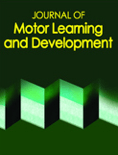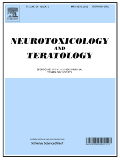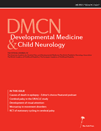
Journal of Motor Learning and Development
Scope & Guideline
Fostering dialogue in the realm of motor learning and development.
Introduction
Aims and Scopes
- Motor Skill Acquisition and Development:
Research exploring how individuals, especially children, acquire and develop motor skills. This includes studies on fundamental movement skills, the impact of early experiences, and developmental coordination disorders. - Influence of Environmental Factors:
Investigations into how different environments, such as home and school settings, affect motor skill development and physical activity levels among children. - Psychometric Assessments and Tool Validation:
Studies focusing on the validation and reliability of assessment tools for measuring motor competence and related constructs, ensuring that accurate measures are available for researchers and practitioners. - Interventions and Program Evaluations:
Research evaluating various interventions aimed at improving motor skills and physical activity among children, including the effectiveness of physical education programs and community-based initiatives. - Cognitive and Perceptual Influences on Motor Learning:
Exploration of how cognitive processes, including attention, perception, and motivation, impact motor skill learning and performance. - Technological Integration in Motor Learning:
Utilization of technology, such as virtual reality and machine learning, to study and enhance motor learning processes.
Trending and Emerging
- Interdisciplinary Approaches to Motor Learning:
There is an increasing trend toward interdisciplinary research that integrates insights from psychology, neuroscience, and education to better understand motor learning processes. - Focus on Inclusivity and Diversity in Motor Skills Research:
Recent publications emphasize the importance of studying motor skills in diverse populations, including children with disabilities, which highlights a growing commitment to inclusivity in motor development research. - Impact of Technology on Motor Learning:
Emerging research explores how digital tools, apps, and virtual reality can enhance motor skill acquisition and learning, reflecting a broader trend in educational and therapeutic practices. - Psychosocial Factors Influencing Motor Development:
There is a noticeable increase in studies examining how factors such as parental beliefs, social support, and cultural context influence children's motor competencies and physical activity. - Environmental and Contextual Influences:
Research increasingly focuses on how environmental factors, including play settings and community resources, impact motor skill development in children.
Declining or Waning
- Traditional Assessment Methods:
There appears to be a decreasing emphasis on traditional methods of assessing motor skills, as newer, more innovative approaches (like sensor technologies and machine learning) gain traction. - Generalized Motor Competence Studies:
Research focusing broadly on motor competence without specific contextual factors has become less prevalent, possibly due to a shift toward more nuanced studies that consider environmental, social, and psychological influences. - Longitudinal Studies in Homogeneous Populations:
The frequency of longitudinal studies conducted within very specific, homogeneous populations has waned, with more researchers opting for diverse and inclusive participant groups to enhance the generalizability of findings.
Similar Journals

NEUROREHABILITATION AND NEURAL REPAIR
Empowering Progress in Neural Repair.NEUROREHABILITATION AND NEURAL REPAIR, published by SAGE Publications Inc, is a leading journal in the fields of neurology and rehabilitation, addressing critical issues in neurorehabilitation across a broad spectrum of neurological disorders. With an impressive impact factor and consistently ranked in the Q1 category in both Neurology and Rehabilitation, this journal is esteemed for its rigorous peer-reviewed research contributing to advancements in clinical practice and rehabilitation strategies. The journal boasts an HIndex that reflects its global influence and is highly regarded among professionals and researchers, ranking in the top tiers of Scopus metrics across various categories. Since its inception in 1987, NEUROREHABILITATION AND NEURAL REPAIR has fostered innovative research aimed at improving outcomes for patients with neurological impairments, making it a crucial resource for those engaged in clinical research and therapeutic interventions. Explore this prestigious journal to stay at the forefront of developments in neurorehabilitation, with access options available for diverse readerships.

Neuron
Illuminating the pathways of brain research.Neuron is a premier journal in the field of neuroscience, published by CELL PRESS in the United States. Since its inception in 1988, this esteemed publication has been at the forefront of neuroscientific research and continues to shape our understanding of the brain and nervous system. With an impressive 2023 Scopus rank of #5 out of 113 in General Neuroscience and a notable Q1 quartile classification, Neuron is recognized for its high-quality, impactful contributions to both established and emerging areas of neuroscience. The journal does not operate under an open access model, yet it offers unparalleled insights and rigorous peer-reviewed research that are essential for researchers, professionals, and students alike. By publishing cutting-edge findings and fostering critical discussions, Neuron plays a vital role in advancing our collective knowledge in this constantly evolving field, making it an indispensable resource for anyone aiming to stay ahead in neuroscience research.

BRAIN BEHAVIOR AND EVOLUTION
Connecting Brain Function to Behavioral EvolutionBRAIN BEHAVIOR AND EVOLUTION, with ISSN 0006-8977 and E-ISSN 1421-9743, is a prominent journal dedicated to the intricate connections between brain function, behavior, and evolutionary processes. Published by KARGER in Switzerland, this journal has established itself as a crucial resource in the fields of Behavioral Neuroscience and Developmental Neuroscience, evidenced by its respectable 2023 category quartiles of Q2 and Q3, respectively. With a rich publication history spanning from 1968 to 2024, BRAIN BEHAVIOR AND EVOLUTION presents original research articles, reviews, and theoretical contributions that investigate the biological underpinnings of behavior, making it an essential platform for researchers, professionals, and students committed to advancing our understanding of neurobiological and evolutionary mechanisms. Although it is not an open-access journal, its rigorous peer-review process ensures that only high-quality research is disseminated, maintaining the journal's impact in the academic community.

Frontiers in Human Neuroscience
Illuminating the Path of Human Neurobiological ExplorationFrontiers in Human Neuroscience is a premier open access journal published by FRONTIERS MEDIA SA, dedicated to advancing the understanding of the complexities of human neuroscience. With an ISSN of 1662-5161, the journal has established its prominence in various fields, achieving a Q2 ranking in categories such as Behavioral Neuroscience, Neuropsychology and Physiological Psychology, and Psychiatry and Mental Health as of 2023. Since its inception in 2008, Frontiers in Human Neuroscience has consistently contributed to the scholarly dialogue by offering a platform for innovative research that bridges the gap between neuroscience and behavioral science. The journal's rigorous peer-review process and commitment to open access ensures that findings are readily available, promoting collaboration and progress within the academic community. With an impact on neuroscience disciplines, it stands at the forefront of the field, inviting researchers, professionals, and students alike to engage with cutting-edge studies and developments. The journal's address is located in Lausanne, Switzerland, where it continues to flourish as a hub for neurobiological exploration.

PERCEPTUAL AND MOTOR SKILLS
Exploring the Intricacies of Perception and MotionPERCEPTUAL AND MOTOR SKILLS is a distinguished academic journal published by SAGE Publications Inc, primarily focusing on the disciplines of Experimental and Cognitive Psychology as well as Sensory Systems. With a legacy dating back to its inception in 1962 and continuing through to 2024, this journal serves as a vital resource for researchers and professionals in understanding the complexities of perception and motor processes. Although it currently holds a Q3 status in major categories, it consistently contributes to the discourse of these critical fields, ranking within the 40th and 29th percentiles for its respective categories according to Scopus metrics. While not an open-access journal, PERCEPTUAL AND MOTOR SKILLS remains a reputable platform for disseminating research findings, ensuring that insights on human perception and motor function are accessible to a broader academic audience. With an aim to advance scholarly discussion and foster innovative research, this journal is an essential read for those endeavoring to explore the rich interplay between perceptual mechanics and motor skills.

Pensar en Movimiento-Revista de Ciencias del Ejercicio y la Salud
Elevating public health through evidence-based practices.Pensar en Movimiento - Revista de Ciencias del Ejercicio y la Salud is a distinguished peer-reviewed journal published by Universidad de Costa Rica, Escuela de Educación Física y Deportes. With an ISSN of 1409-0724 and an E-ISSN of 1659-4436, this Open Access journal has been a pivotal platform for scholarly communication since its inception in 2001. Dedicated to advancing the fields of exercise sciences and health, the journal provides a robust forum for researchers, professionals, and students to share high-quality research, innovative practices, and critical insights. As an essential resource in the Latin American academic landscape, it fosters interdisciplinary dialogue and promotes evidence-based practices in physical education and health. Researchers and practitioners alike will find valuable content aimed at enhancing physical activity, wellness, and health education, making it a vital tool for those committed to improving public health and promoting an active lifestyle.

NEUROTOXICOLOGY AND TERATOLOGY
Cultivating a deeper comprehension of toxic effects on the nervous system.NEUROTOXICOLOGY AND TERATOLOGY, published by PERGAMON-ELSEVIER SCIENCE LTD, is a premier journal dedicated to advancing knowledge in the critical fields of neuroscience and toxicology. With a focus on the mechanisms of neurotoxic effects and developmental disturbances, this journal serves as a vital resource for researchers, practitioners, and students committed to understanding the complexities of neurotoxicology and its implications for human health. The journal boasts a solid impact factor and holds esteemed quartile rankings, being classified as Q3 in both Cellular and Molecular Neuroscience and Developmental Neuroscience, and Q2 in Toxicology as of 2023. Despite being a subscription-based journal, NEUROTOXICOLOGY AND TERATOLOGY is recognized for its authoritative peer-reviewed articles that encompass a broad spectrum of research from 1987 to 2024, making it indispensable for those who seek in-depth knowledge and current scientific discourse in the field. Its impactful position within Scopus rankings underlines its importance, with notable placement across various neuroscience and toxicology categories.

DEVELOPMENTAL MEDICINE AND CHILD NEUROLOGY
Connecting research to practice in child health and development.DEVELOPMENTAL MEDICINE AND CHILD NEUROLOGY, published by WILEY, is a premier journal dedicated to advancing knowledge in the fields of developmental neuroscience, clinical neurology, and pediatrics. With an impressive impact factor, this journal is recognized for its contributions, achieving Q1 ranking in both Pediatrics, Perinatology and Child Health, and Neurology (Clinical) sectors, as well as Q2 in Developmental Neuroscience. Since its inception in 1958, the journal has been at the forefront of disseminating vital research that informs clinical practice and enhances child health outcomes. Researchers and practitioners benefit from its high-quality, peer-reviewed articles that address critical issues in child neurology, underpinned by a robust Scopus ranking and a formidable percentile standing in relevant categories. While currently not an open-access journal, it remains a key resource for those dedicated to the study of child development, particularly at its intersection with neurological health. With a commitment to excellence, DEVELOPMENTAL MEDICINE AND CHILD NEUROLOGY is an essential read for anyone engaged in the care and research of pediatric populations.

NEUROREHABILITATION
Shaping the future of rehabilitation with evidence-based practices.Welcome to NEUROREHABILITATION, a premier journal dedicated to advancing the field of rehabilitation, specializing in neurology and physical therapy. Published by IOS PRESS, the journal has established itself as a crucial platform for disseminating high-quality, peer-reviewed research since its inception in 1991. Located in the Netherlands, NEUROREHABILITATION has achieved significant recognition within the academic community, reflected in its impressive impact factor and Scopus rankings, including a Q2 categorization in Rehabilitation and Physical Therapy, highlighting its relevance and influence in these essential domains. With a commitment to enhancing clinical practices and outcomes for individuals with neurological conditions, this journal serves as an invaluable resource for researchers, clinicians, and students alike. Although it currently operates under a subscription model, NEUROREHABILITATION continues to contribute meaningfully to the ongoing dialogue in rehabilitation sciences, making it a key player in shaping the future of therapy and patient care.

PSYCHOLOGIA
Fostering Scholarly Dialogue in PsychologyPSYCHOLOGIA is a distinguished academic journal published by the Psychologia Editorial Office, focusing on the broad field of psychology. Originating from Japan, the journal serves as a platform for innovative research and insights into various psychological phenomena, contributing significantly to the advancement of psychological knowledge since its establishment in 1996. With an ISSN of 0033-2852 and an E-ISSN of 1347-5916, PSYCHOLOGIA primarily targets researchers, professionals, and students who are passionate about the intricacies of human behavior and cognition. Currently categorized in the Q4 quartile of psychology (miscellaneous) based on 2023 metrics, it holds a Scopus rank of #157 out of 216, indicating its developing presence within the academic community. Despite being published without open access options, the journal remains committed to fostering scholarly dialogue and disseminating significant findings that shape contemporary psychological research. As it converges towards its issue set for 2024, PSYCHOLOGIA continues to be an essential resource for those seeking to deepen their understanding of psychological sciences.